If I told you that with one mouse click you could impact change, would you believe me? Chances are you wouldn’t.
But Julie Dixon, Deputy Director of Georgetown University’s Center for Social Impact Communication, would have you believe that you could.
Watch the full live stream video from TEDxChange 2013.
At the core of Julie’s talk at TEDxChange 2013 is the notion that in a world where everyone is interconnected by social media, personal influence is a currency that is just as valuable as money.
She asserts that by simply liking a campaign, sharing a photo or video, signing a petition, writing a blog, or supporting a crowd-funded campaign and asking people to take action, you leverage your influence and reach out to other people in your network. These people can potentially influence others; share their money, time or other resources that will enable the success of the cause.
While her talk doesn’t go into the host of other variables that make campaigns successful, she does offer a number of interesting insights in The Permanent Disruption of Social Media, a paper co-written with Denise Keyes. And although the piece is geared towards non-profits, corporate players would benefit from reading it as well.
“Because there are so many different activities that people can be involved with, organizations need to be strategic about what they ask supporters to participate in,” they write. They found that if you ask people to donate money, that is exactly what they will do; if you ask them to forward emails, they will; if you ask for time, they’ll give it – the level of commitment, involvement and influence varies depending on the audience that is reached. This is why it is important to know your audience and have varying yet targeted calls to action.
Source: http://www.ssireview.org/articles/entry/the_permanent_disruption_of_social_media
But getting the ball rolling takes a lot of work and spreading the word on social media can lead to “external ambassadors” (people who don’t work for the organization) spreading the message in their own way. “There’s a certain amount of the ‘they’re not going to say it the way we’re going to say it’ mentality,” says Mark Rovner, founder and principal at Sea Change Strategies, “but the cost-benefit ratio is still going to be positive.”
Loss of control is something that many companies struggle with when delving into social media. But, as Julie Dixon and Denise Keyes state, “…perhaps with the loss of control comes an increase in authenticity and transparency, both qualities that can greatly enhance an organization’s overall communications.”
So, are you ready to lose a bit of control and impact change?
Find out more about great initiatives and ideas stemming from TEDxChange by visiting TEDxBrusssels and be inspired to take action by reading about some great causes that can truly make a difference.












